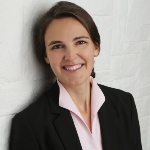Florian Lerch: “Professor Brem, thank you very much for the opportunity to do this interview. What fascinates you about your research areas of innovation and entrepreneurship?”
Alexander Brem: I am always fascinated by how the new comes into the world. Because there are very many people who have excellent ideas, but very few who actually implement them, or at least try to. With our interdisciplinary and international research areas at the Institute, we cover the necessary range from creativity to the development of new industries. We link this research not only consistently with teaching, but also with transfer to industry. It is important to me not only to talk about innovation and entrepreneurship, but also to become active - or to put it in the words of Erich Kästner: “There is nothing good unless you do it”. The spectrum ranges from organizing our institute to supporting teams like Semanux.
Florian Lerch: The start-up Semanux develops software that makes it easier for people with motor impairments to surf the Internet and operate computers. They are joining us in the process. What do they think makes the software and the team special?
Alexander Brem: The competences of the three Semanux founders complement each other perfectly and cover the essential areas of product development with their education and experience. With you as a businessman, the team is rounded out, especially with your experience in IT consulting and digital business models. In addition, the underlying technology has already been validated on end users. The team knows that the product will create real value with the target audience. It is true that the upcoming marketing and sales work is often the sticking point for tech-oriented startups. However, the team can also draw on a strong support network and is adequately funded as part of the EXIST research transfer program.
Florian Lerch: Semanux relies on AI technology for this. Is AI just a hype that will pass again or can companies actually be built on it?
Alexander Brem: I always keep the Gartner Hype Cycle for technologies in mind when I ask this question. Every promising technology goes through a process of inflated expectations that leaves observers and users temporarily disillusioned before the technology’s then realistic potentials become apparent and prevail. We are already seeing how successful AI startups are emerging in Baden-Württemberg or how AI is being successfully established in companies. But there are also signs that AI-driven business models differ from the business models of conventional software startups. As a researcher, this makes me particularly curious.
Florian Lerch: Why do you think young founders should found their startup in Stuttgart, and not somewhere else in Germany or the world?
Alexander Brem: Here at the Vaihingen campus, we have an incredible density of excellent research and teaching facilities. In total, this is probably even one of the largest science campus locations in Germany. The technologies that are developed here offer immense potential for spin-offs with a transformative character. Due to the proximity and short distances, a unique network of startups, founders and startup support is created here, which we bundle under the flag of StartupCampus0711.de. We also continue to have a lot of world-class industry in Stuttgart. This helps business-to-business startups in particular to gain local customers early on and bring their technologies to market quickly.
Florian Lerch: You are a mentor for several startups. What is your most important advice for aspiring startups?
Alexander Brem: We still see many startups that spend too long in the lab tweaking their product. The Swabian characteristic of wanting to do everything as perfectly as possible is still very widespread. In principle, there’s nothing wrong with that for the time being. For a startup, however, there is a danger of not meeting the needs of its customers. That’s why I also advise technically oriented founders to get in touch with potential customers early on in order to learn as much as possible about their real problems and to develop the business model based on that.
Florian Lerch: Interesting, do you have any other tips for founders?
Alexander Brem: Just do it :)
Fun aside, we have a very good network of coaches who can help with this decision. In addition, we offer many events and workshop formats together with Gradus and other partners, where you can experience the topic and benefit from the exchange with experienced founders. At this point, I can only advise anyone interested to drop by one of the many events. Ideally, this will help you to make a decision - and at least you will always meet nice and interesting people.
Florian Lerch: We thank you for the interview and look forward to further cooperation with you!
| Contact | This interview was first published on Semanux’s blog. |
|---|
Contact

Melanie Minderjahn
Career Service - Inner Development, Public Relations


